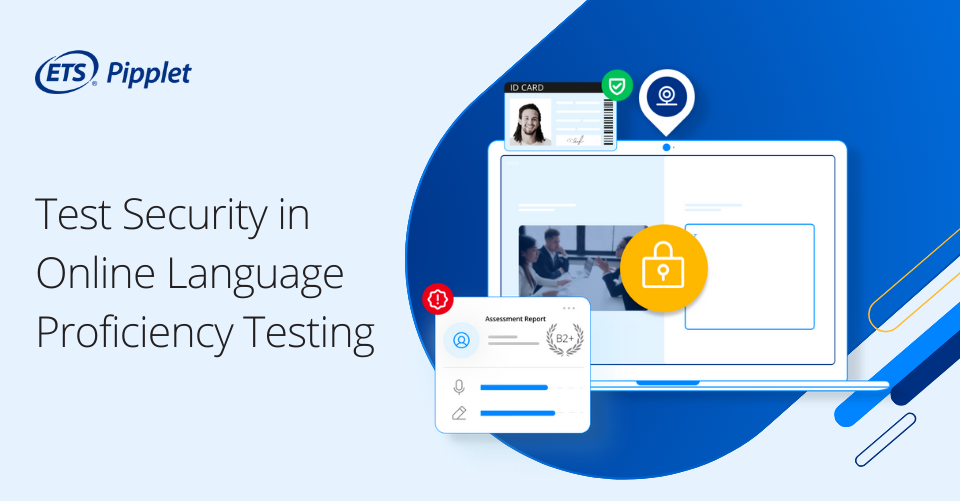How to Combat New Forms of Cheating in Online Language Testing
For many companies and academic institutions, making the switch from traditional on-site testing to remote online testing isn’t easy, especially with concerns about cheating. Test takers can find ways to cheat, but the latest advancements in online test proctoring ensure these don’t go undetected.
Online assessments saw a rise in popularity during and after the COVID pandemic. Language testing, in particular, is reportedly experiencing an “unprecedented boom in remote test administration,” according to a 2023 study
published in
Language Assessment Quarterly.
Coinciding with this growth in popularity, however, are concerns around test security. Cheating undermines the accuracy and reliability of assessments, ultimately leading to a misrepresentation of candidates' skills.
One common scenario where cheating occurs is when candidates attempt to use external resources or receive unauthorized assistance. With easy access to generative AI like ChatGPT or assistive writing browser extensions, test takers have found new ways to cheat and take advantage of technology to slip through an online remote test if not properly monitored.
For this reason, most organizations that
screen applicants online also work to ensure their assessments are safe and secure – and that such tests yield accurate results. They do so by aligning with a reputable partner in online test proctoring.
Without a proper security system, cheating not only disadvantages honest candidates but also undermines the hiring process by allowing unqualified individuals to advance based on fraudulent representations.
Innovations in Remote Test Proctoring: How to Keep Errant Test Takers in Check
To deter and detect cheating in online assessments, organizations employ several strategies to uphold the integrity and validity of the process:
- Secure testing environments: Organizations use secure testing platforms equipped with features to prevent unauthorized access and ensure test-takers cannot navigate away from the assessment browser window. These platforms often include lockdown browser functionality to restrict access to external websites and applications during the test.
- Automated proctoring: Automated proctoring solutions use AI algorithms to monitor test-takers remotely in real-time. These systems detect suspicious behaviors such as looking away from the screen, attempting to communicate with others, or using unauthorized aids. Proctors can intervene if irregularities are detected, such as by issuing warnings or terminating the test session.
- Randomized question banks: To minimize the risk of cheating through collaboration or sharing of answers, companies frequently utilize randomized question banks. Each test-taker receives a unique set of questions selected from a large pool, reducing the likelihood of candidates accessing identical assessments and sharing answers.
- Time limits and timed sections: Implementing time limits for each section of the test helps prevent candidates from consulting external resources or seeking assistance during the assessment. Additionally, time constraints encourage test-takers to focus on answering questions promptly and accurately, reducing the opportunity for cheating.
- Identity verification: Robust identity verification measures, such as facial recognition technology or government-issued ID verification, ensure that the individual taking the test is indeed the registered candidate. This helps prevent impersonation and ensures the authenticity of test results.
- Plagiarism detection software: For written components of language tests, companies use plagiarism detection software to identify instances of copied or unoriginal content. This helps maintain the integrity of written responses and ensures that candidates demonstrate their own language proficiency skills.
Pipplet: Balancing Cheating Prevention and Smooth Online Test Experience

Unlike most proctoring services where the setup can make test takers feel uncomfortable, Pipplet’s advanced online proctoring system is built to foster trust between test takers and employers by ensuring a fair and transparent assessment process:
1) Identity Verification
- Visual Monitoring provides assurance that the person taking the test is the one who is supposed to, reducing the risk of impersonation.
- Stripe Identity reinforces this by regularly verifying the test taker’s identity, adding another layer of trust through consistent checks.
2) Behavior Management
- Focus Track maintains test integrity by ensuring that candidates remain within the testing environment, signaling commitment to the test's seriousness.
- Copy-Paste Protection preserves the authenticity of the responses, giving employers confidence in the originality of candidates’ skills and knowledge.
- Extension Protection prevents the use of unauthorized aids, promoting an equal playing field for all candidates.
- Double Human Invigilation adds a nuanced human perspective to the process, demonstrating to both parties that the testing is fair and thoroughly monitored. In written and spoken recordings, language examiners are able to detect and flag various unusual behavior such as a suspicious difference between skills, possible AI content, and relatedness of the answer to the question at hand. Any flagged suspicious behavior are then further investigated and confirmed by Pipplet's internal review team.
3) Contextualized Reporting
- Unusual Behavior Notification keeps employers informed of any potential integrity breaches, showing vigilance in maintaining standards.
- Access to Responses allows for transparency in the evaluation process, enabling employers to review the detailed context behind candidates' scores.
Collectively, these features show that the employer values a legitimate assessment process and respects the candidate's experience, thereby strengthening mutual trust.
Conclusion
Cheating continues to pose a significant challenge. However, employers and educational institutions are increasingly turning to innovative online language testing services like Pipplet to uphold the integrity of assessments.
Implementing a combination of these measures can help employers deter cheating effectively while promoting fairness and accuracy in candidate evaluations.
Related stories

Pipplet info
10 rue de Penthièvre, 75008 Paris
RCS Paris 813 493 673 00012
Pipplet 2022.
Tous droits réservés
Copyright © 2023 par Pipplet. Tous droits réservés. Toute utilisation ou reproduction non autorisée est strictement interdite. Pipplet est une marque déposée de Pipplet. ETS et le logo ETS sont des marques déposées d'ETS, utilisées sous licence en France par Pipplet.








